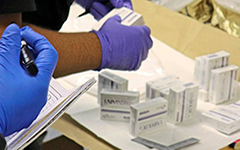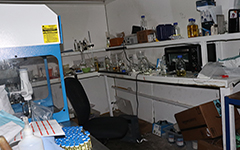Thousands of steroid users facing HIV risk
A needle and syringe exchange programme in Essex hands out 100,000 needles a year for Image and Performance Enhancing Drug (IPED) use, making up a third of its total needle distribution. And as part of National HIV Testing Week, UK Anti-Doping (UKAD) is urging users of injectable IPEDs to get themselves checked out.
Alcohol and drug charity, Open Road, received more than 1,800 visits across its five sites in Essex between January and September this year – an average of 200 per month. Of these, just over a third of visits were for IPED use exchanges.
To ensure drug users inject with new, non-contaminated equipment, Open Road’s five sites also distributed 40,000 needles during 2017/18 which, when added to those distributed by the pharmacies in Open Road’s county-wide exchange programme, brought the total to nearly 300,000, with a third being for IPED use.
The risk of contracting blood-borne viruses was highlighted in a study carried out in 2013 by Public Health England and Liverpool John Moores University. The results showed that one in 10 of the sample of IPED users had been exposed to one or more of HIV, Hepatitis B, or Hepatitis C. The transmission of these blood-borne viruses was attributed to factors such as unprotected sex and high-risk injection practices, such as the sharing of needles, syringes and other injection equipment.
Open Road’s Quality and Treatment Manager, Jody Leach, said: “The sheer number of people we support through our needle exchange programme highlights how widespread the issue is.
“By offering this service, however, we can help this population use needles in a more controlled fashion to combat the risk of HIV and other blood-borne viruses. But we are only addressing a small percentage of users through our charity, and so it is imperative people who do inject seek advice and get themselves checked for HIV.”
According to the latest National IPED Survey, carried out by Liverpool John Moores University and Public Health Wales, 85% of the 684 participants recruited from gyms and needle and syringe exchange programmes had used injectable IPEDs. The survey data indicated the presence of high-risk injecting practices, such that:
-
18% of the IPED users had reused their own injecting equipment
-
15% of the IPED users had shared a multi-dose drug vial
In addition, less than a third of the participants (31%) reported ever having had a diagnostic test for HIV.
UKAD Medical Programmes Officer, Sam Pool, said: “It’s vital athletes at all levels, including gym-goers, understand the dangers of using Image and Performance Enhancing Drugs.
“Research indicates a growing trend of IPED use, which is a concern for UKAD particularly because of the potential for this to seep into the sporting arena. Athletes may often be aware that these substances are banned in sport for performance enhancing reasons, but the associated health implications must be taken seriously.
“Not only can anabolic steroids and other IPEDs cause heart attacks, strokes, infertility, and liver damage, but sharing of needle equipment or multi-dose drug vials when injecting these substances can result in the transmission of HIV and other blood-borne viruses.
“It is a serious risk simply not worth taking and we would urge anyone who has injected IPEDs to get checked out. Testing is easy and accessible in the UK through community-based or postal testing schemes.”


